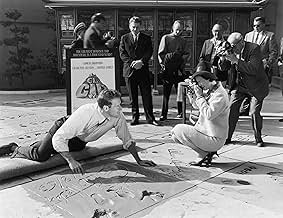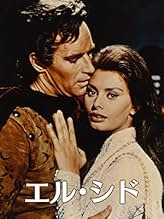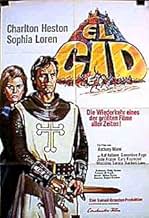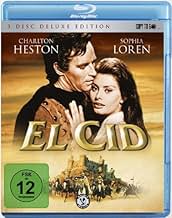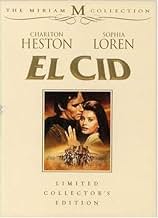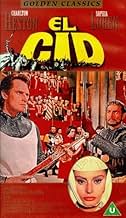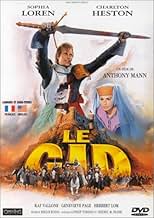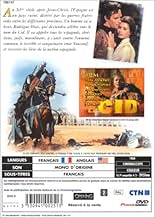IMDb रेटिंग
7.2/10
17 हज़ार
आपकी रेटिंग
अपनी भाषा में प्लॉट जोड़ेंThe fabled Spanish hero Rodrigo Diaz de Vivar (a.k.a. El Cid) overcomes a family vendetta and court intrigue to defend Christian Spain against the Moors.The fabled Spanish hero Rodrigo Diaz de Vivar (a.k.a. El Cid) overcomes a family vendetta and court intrigue to defend Christian Spain against the Moors.The fabled Spanish hero Rodrigo Diaz de Vivar (a.k.a. El Cid) overcomes a family vendetta and court intrigue to defend Christian Spain against the Moors.
- 3 ऑस्कर के लिए नामांकित
- 7 जीत और कुल 13 नामांकन
Geneviève Page
- Princess Urraca
- (as Genevieve Page)
Gérard Tichy
- King Ramírez
- (as Gerard Tichy)
फ़ीचर्ड समीक्षाएं
El Cid is the story of legendary Rodrigo Diaz who lifted his country with valour and integrity to drive the Moorish invaders from Spain.
I think the best thing I can say about this film is that even though it's nearly three hours long, I never once look at the clock. It's a thoroughly engaging picture that boasts all the great hallmarks of a sweeping historical epic. The colour, the costumes, the scope, and the attention to detail from director Anthony Mann are first rate, and par for the course is the suitably rousing score from Miklos Rozsa. Big square jawed bronzed beefcake Charlton Heston takes the lead role as Diaz, and firmly cements himself as the go to guy for gargantuan epics. Support comes in the form of Sophia Loren, Genevieve Page, Raf Vallone, John Fraser (excellent), and Gary Raymond (also excellent).
The story is an excellent one because Diaz was such a fine character from the annals of Spanish history, uniting the sulking Christian kings of Spain whilst simultaneously lifting the people of the streets off their knees and getting them to believe in the cause. However, it has to be said that this is far from the perfect historical epic movie, even allowing for the usual Hollywoodisation of facts, one can't quite get past the fact that El Cid comes across as a glamorised glory tale without any hindrances. Surely here in the 11th century El Cid's path would have been fraught and sodden with a great deal more death and destruction? There's a tameness where there should be serrated edges to the story and it takes away greatly from the film's end because the build up of Cid's heroism actually didn't contain a great deal of hard work - it was a stroll in the park so to speak.
Still, it's a wonderful film that ticks all the boxes for genre staples, and as churlish as I may be as regards the assumptive nature of El Cid's story being told here, I'm still the first to start cheering and thumping my chest as the credits role, and not even Sophia Loren's pout can distract me from the bravado warmth washing over me. 8/10
I think the best thing I can say about this film is that even though it's nearly three hours long, I never once look at the clock. It's a thoroughly engaging picture that boasts all the great hallmarks of a sweeping historical epic. The colour, the costumes, the scope, and the attention to detail from director Anthony Mann are first rate, and par for the course is the suitably rousing score from Miklos Rozsa. Big square jawed bronzed beefcake Charlton Heston takes the lead role as Diaz, and firmly cements himself as the go to guy for gargantuan epics. Support comes in the form of Sophia Loren, Genevieve Page, Raf Vallone, John Fraser (excellent), and Gary Raymond (also excellent).
The story is an excellent one because Diaz was such a fine character from the annals of Spanish history, uniting the sulking Christian kings of Spain whilst simultaneously lifting the people of the streets off their knees and getting them to believe in the cause. However, it has to be said that this is far from the perfect historical epic movie, even allowing for the usual Hollywoodisation of facts, one can't quite get past the fact that El Cid comes across as a glamorised glory tale without any hindrances. Surely here in the 11th century El Cid's path would have been fraught and sodden with a great deal more death and destruction? There's a tameness where there should be serrated edges to the story and it takes away greatly from the film's end because the build up of Cid's heroism actually didn't contain a great deal of hard work - it was a stroll in the park so to speak.
Still, it's a wonderful film that ticks all the boxes for genre staples, and as churlish as I may be as regards the assumptive nature of El Cid's story being told here, I'm still the first to start cheering and thumping my chest as the credits role, and not even Sophia Loren's pout can distract me from the bravado warmth washing over me. 8/10
As a movie El Cid grows on you. At first it is the story of a relatively ordinary man whose trip to his wedding is interrupted by a battle between the Moors and the Christians of 11th century Spain. But this is no ordinary man. Or perhaps he is an ordinary man who is destined to do extraordinary things. Early on he is forced to kill his fiancé's father as a matter of family honor, thus earning the enmity of his fiancé, who nonetheless cannot stop loving him, however hard she tries. And much of the story is devoted to the doomed nature of their love, as historical events continue to overtake the plans they would rather make. And with each new episode El Cid's stature grows, from warrior to hero to legend to mythic figure. Even in exile he has a following. And if the script is not true to history, this film still does a great service to the memory of a great man who put God and country ahead of himself. Something extra must be said about the crowd scenes. There were real people out there, not multiple CGI images made to look like the hordes that are a part of all epics. Over 30,000 costumes were made for this movie and General Franco donated the Spanish army to fill them. The difference is stunning, and sobering. There is a reality to the battle scenes that simply doesn't obtain in later movies such as Gladiator or Lord of the Rings. Now that old films such as this are so readily available in various formats we are presented with the dilemma of deciding which ones should occupy our bookshelves, to return to again, to remember a detail, or to reclaim the feeling that the story may create. In terms of the greatness, the mission and the struggles of the human spirit, this one's a keeper.
For me, El Cid is a wonderful movie, great story, magnificent action scenes and shot very close to where the original saga is believed to have taken place. I'll never forget the image of the dead El CID riding along the beach into eternity on his magnificent white horse. Taking all this into account,I was very surprised to read where Charlton Heston said he was very disappointed with this particular movie and believed the director was not equel to the task of directing such an epic undertaking. This was not obvious to me as I found the battle scenes very exciting and very well executed, but the late MR. Heston stated that had the directing duties been undertaken by David Lean, who was his preferred choice, the movie could have been really great, rather than just "adequate" Hestons own words. Still, it remains for many people a great film and in these days of boring CG effects, it is a great example of movies as they should be made.
Grim, Ponderous, Moving, Magnificent
I'm a girl and have a girl's taste in movies. If I'm going to watch a movie with a lot of sword fights, oppressed peasants, and corrupt kings, I want it to be a swashbuckler, preferably one starring Errol Flynn. Swashbucklers bring a lot of humor to otherwise unbearable dramatic situations.
"El Cid" presents unbearable dramatic situations, and it is not a laugh riot. I saw the three-hour plus, uncut version and never felt tempted to laugh once. This is the Middle Ages without Monty Python, without the levity of an Errol Flynn - Olivia De Haviland romance or comic relief of a Little John.
Boy oh boy was this grim. And long. You could have almost filmed the entire film with three colors: white, black, and red. Lots of red.
But "El Cid" did to me what it wanted to do. I really believed in Rodrigo and Jimena as star-crossed, larger-than-life lovers. I really believed that the little girl who leads them from her well to her farm house lived a thousand years ago. I really believed that something like the mouth of hell itself was opening up as Ben Yusef invaded. I really believed in Rodrigo's relentless nobility and heroism. Neither Charlton Heston's strangely artificial looking hair nor the obvious non-Arab status of a couple of the "Moors" (Douglas Wilmer, who later played Sherlock Holmes, was one especially unconvincing Arab) interfered with my willing suspension of disbelief. I cried. Several times.
There's a lot to cry about. In almost every scene, someone is either crying, usually Sophia Loren, or gritting his teeth, often Charlton Heston, but others grit their teeth a lot, also. Actually Loren doesn't so much cry, but, rather, huge, luminous tears quiver, poised, on her lower eyelid. In her final scenes, the teardrop dancing on her right eyelid is so huge, black and luminous it begins to look like a second pupil.
If the sound of horse hoof-beats does something for you, you will love this movie. There are many horses. Many, many, many. And they are always thundering off to somewhere, more often than not, over cobblestones. Lots of horse hoof-beats on this soundtrack.
Some viewers found the plot hard to understand; they, perhaps, saw the cut version. Having seen the uncut version, I found the plot entirely comprehensible.
"El Cid" is like a ballad. There is one grim face-off after another, escalating in gravity, in which the hero proves that he is growing into his own heroism, through every choice he makes. Each choice is harder than the last one, until his final choice, which is truly impossible, but which he fulfills anyway. If you like medieval ballads, you may love this movie. It has the same grim beauty and power and inexorability, the same insistence on throwing whatever is divine in naked human character up against the impossible demands of earthly life.
For such a long movie, there is scant dialogue. With few words, people prove their true character through their actions, just as characters in ancient epics did.
One viewer complained that this movie bore no relation to the "real" El Cid legend. If that is true, the movie is all the more remarkable. The filmmakers managed to create, from scratch, a convincing and moving medieval narrative.
I'm a girl and have a girl's taste in movies. If I'm going to watch a movie with a lot of sword fights, oppressed peasants, and corrupt kings, I want it to be a swashbuckler, preferably one starring Errol Flynn. Swashbucklers bring a lot of humor to otherwise unbearable dramatic situations.
"El Cid" presents unbearable dramatic situations, and it is not a laugh riot. I saw the three-hour plus, uncut version and never felt tempted to laugh once. This is the Middle Ages without Monty Python, without the levity of an Errol Flynn - Olivia De Haviland romance or comic relief of a Little John.
Boy oh boy was this grim. And long. You could have almost filmed the entire film with three colors: white, black, and red. Lots of red.
But "El Cid" did to me what it wanted to do. I really believed in Rodrigo and Jimena as star-crossed, larger-than-life lovers. I really believed that the little girl who leads them from her well to her farm house lived a thousand years ago. I really believed that something like the mouth of hell itself was opening up as Ben Yusef invaded. I really believed in Rodrigo's relentless nobility and heroism. Neither Charlton Heston's strangely artificial looking hair nor the obvious non-Arab status of a couple of the "Moors" (Douglas Wilmer, who later played Sherlock Holmes, was one especially unconvincing Arab) interfered with my willing suspension of disbelief. I cried. Several times.
There's a lot to cry about. In almost every scene, someone is either crying, usually Sophia Loren, or gritting his teeth, often Charlton Heston, but others grit their teeth a lot, also. Actually Loren doesn't so much cry, but, rather, huge, luminous tears quiver, poised, on her lower eyelid. In her final scenes, the teardrop dancing on her right eyelid is so huge, black and luminous it begins to look like a second pupil.
If the sound of horse hoof-beats does something for you, you will love this movie. There are many horses. Many, many, many. And they are always thundering off to somewhere, more often than not, over cobblestones. Lots of horse hoof-beats on this soundtrack.
Some viewers found the plot hard to understand; they, perhaps, saw the cut version. Having seen the uncut version, I found the plot entirely comprehensible.
"El Cid" is like a ballad. There is one grim face-off after another, escalating in gravity, in which the hero proves that he is growing into his own heroism, through every choice he makes. Each choice is harder than the last one, until his final choice, which is truly impossible, but which he fulfills anyway. If you like medieval ballads, you may love this movie. It has the same grim beauty and power and inexorability, the same insistence on throwing whatever is divine in naked human character up against the impossible demands of earthly life.
For such a long movie, there is scant dialogue. With few words, people prove their true character through their actions, just as characters in ancient epics did.
One viewer complained that this movie bore no relation to the "real" El Cid legend. If that is true, the movie is all the more remarkable. The filmmakers managed to create, from scratch, a convincing and moving medieval narrative.
Aroused by a fanatical Moorish warlord, emir-king attack a Castilian village, where they are captured by Rodrigo Diaz de Vivar
Vigorously brave and compassionate, the noble Rodrigo hates bloodshed and vows to see his country at peace, frees the prisoners on their solemn pledge never again to attack Castile
For this act of courage and mercy, one of the Emirs, Moutamin, calls Rodrigo "El Cid," and pledges eternal friendship to the Cid of Vivar And so, in freeing the Moors, Rodrigo, accidentally, stumbled onto a battle, not to his luscious bride, but to a battle that will change his whole life
In the court of King Ferdinand, Rodrigo's act of clemency is misinterpreted, and he's accused of treason by his rival Don Ordonez for refusing to turn over to him the captures Moors
Unfortunately, Rodrigo's aged father, Don Diego, is slapped by the Champion of the king, Count Gormaz, father of his beloved Chimene Rodrigo begs Gormaz an apology; it is refused A duel begins and the champion is badly wounded Before he dies, however, he asks Chimene to avenge his death
Chimene's wish is fulfilled when King Ramiro of Aragon challenges King Ferdinand for the possession of the city of Calahorra by the outcome of a single combat El Cid convinces the king to permit him to fight Don Martin Thus, according to the custom of trial by combat, God would judge Rodrigo's guilt or innocence
"El Cid" is an intense film, lavish and spectacular, bigger than any in terms of cast and impressive as any in visual terms Miklós Rózsa gave a new dimension to the emotion that Anthony Mann was trying to express
Mann gives us a human story with a love story balanced with the most strongly image of a hero the world has ever seen He presented a man of honor who thinks always of his wife, his country, and his king first Even in death, his thoughts are for others and not himself
El Cid insults kings and noblemen in the name of justice and integrity and does what he knows to be right He battles the king's living sword in respect of his father He accepts the challenge of a champion of a king to prove himself innocent of treason and other things He shows a prince how any man can kill and only a king can give life He fights 13 knights, at the same time, to free a prisoner Yet he is in addition to all of this an extremely principled leader He accepts exile for life from the country he loves, and yet he is the only man in Spain who 'could humble a king and would give a leper to drink from his own pouch '
The joust sequence called "The fight for Calahorra," is perhaps the most rousing, exciting, one-to-one combat ever filmed The battle scenes at Valencia are taken on an epic scale But the value of Anthony Mann's movie is the characterization in which Charlton Heston played El Cid's life For this reason alone, the film is of greater value than most any other motion picture experience
Vigorously brave and compassionate, the noble Rodrigo hates bloodshed and vows to see his country at peace, frees the prisoners on their solemn pledge never again to attack Castile
For this act of courage and mercy, one of the Emirs, Moutamin, calls Rodrigo "El Cid," and pledges eternal friendship to the Cid of Vivar And so, in freeing the Moors, Rodrigo, accidentally, stumbled onto a battle, not to his luscious bride, but to a battle that will change his whole life
In the court of King Ferdinand, Rodrigo's act of clemency is misinterpreted, and he's accused of treason by his rival Don Ordonez for refusing to turn over to him the captures Moors
Unfortunately, Rodrigo's aged father, Don Diego, is slapped by the Champion of the king, Count Gormaz, father of his beloved Chimene Rodrigo begs Gormaz an apology; it is refused A duel begins and the champion is badly wounded Before he dies, however, he asks Chimene to avenge his death
Chimene's wish is fulfilled when King Ramiro of Aragon challenges King Ferdinand for the possession of the city of Calahorra by the outcome of a single combat El Cid convinces the king to permit him to fight Don Martin Thus, according to the custom of trial by combat, God would judge Rodrigo's guilt or innocence
"El Cid" is an intense film, lavish and spectacular, bigger than any in terms of cast and impressive as any in visual terms Miklós Rózsa gave a new dimension to the emotion that Anthony Mann was trying to express
Mann gives us a human story with a love story balanced with the most strongly image of a hero the world has ever seen He presented a man of honor who thinks always of his wife, his country, and his king first Even in death, his thoughts are for others and not himself
El Cid insults kings and noblemen in the name of justice and integrity and does what he knows to be right He battles the king's living sword in respect of his father He accepts the challenge of a champion of a king to prove himself innocent of treason and other things He shows a prince how any man can kill and only a king can give life He fights 13 knights, at the same time, to free a prisoner Yet he is in addition to all of this an extremely principled leader He accepts exile for life from the country he loves, and yet he is the only man in Spain who 'could humble a king and would give a leper to drink from his own pouch '
The joust sequence called "The fight for Calahorra," is perhaps the most rousing, exciting, one-to-one combat ever filmed The battle scenes at Valencia are taken on an epic scale But the value of Anthony Mann's movie is the characterization in which Charlton Heston played El Cid's life For this reason alone, the film is of greater value than most any other motion picture experience
क्या आपको पता है
- ट्रिवियाAccording to the legend of El Cid, in his youth Rodrigo came across a leper sinking in quicksand crying for help, but none of the bystanders dared touch him. Rodrigo pulled him from the bog, clothed him in his cloak, housed him in a barn, and went to get him some food. When he returned, he found the leper had transformed into an angelic figure that identified himself as St. Lazarus. He said "For your bravery and kindness, you will enjoy success as a warrior. You will win battles upon battles and never know defeat." In a nice nod to the legend, this movie contains a scene wherein the banished Rodrigo encounters a thirsty leper who begs a drink. After unhesitatingly offering his own pouch, the Leper thanks him by name. "Who are you?" asks Rodrigo. "I am called Lazarus", the leper answers. Then he crosses Rodrigo with his staff. "May helping hands be extended to you everywhere you go, my Cid."
- गूफ़Alone and on horseback, Rodrigo confronts a group of mounted guards escorting the prince to a dungeon. In response to Rodrigo's demand for the release of the prisoner, the captain of the guard laughingly says, "There are thirteen of us, and you are alone!" In the ensuing fight, Rodrigo, with some help from the prince, unhorses sixteen guards, and two remaining mounted ones flee, for a total of eighteen.
- इसके अलावा अन्य वर्जन1993 reissue restores 16 minutes of "lost" footage.
- साउंडट्रैकThe Falcon and the Dove
(uncredited)
Lyrics by Paul Francis Webster
Music by Miklós Rózsa
Performed by Chorus
टॉप पसंद
रेटिंग देने के लिए साइन-इन करें और वैयक्तिकृत सुझावों के लिए वॉचलिस्ट करें
- How long is El Cid?Alexa द्वारा संचालित
- Midwest Premiere Happened When & Where?
- "El Cid"---Was It Filmed in Spain?
विवरण
- रिलीज़ की तारीख़
- कंट्री ऑफ़ ओरिजिन
- भाषाएं
- इस रूप में भी जाना जाता है
- Cid
- फ़िल्माने की जगहें
- Torrelobaton Castle, Valladolid, Castilla y León, स्पेन(for Vivar, El Cid's home town)
- उत्पादन कंपनियां
- IMDbPro पर और कंपनी क्रेडिट देखें
बॉक्स ऑफ़िस
- बजट
- $62,50,000(अनुमानित)
- चलने की अवधि3 घंटे 2 मिनट
इस पेज में योगदान दें
किसी बदलाव का सुझाव दें या अनुपलब्ध कॉन्टेंट जोड़ें



